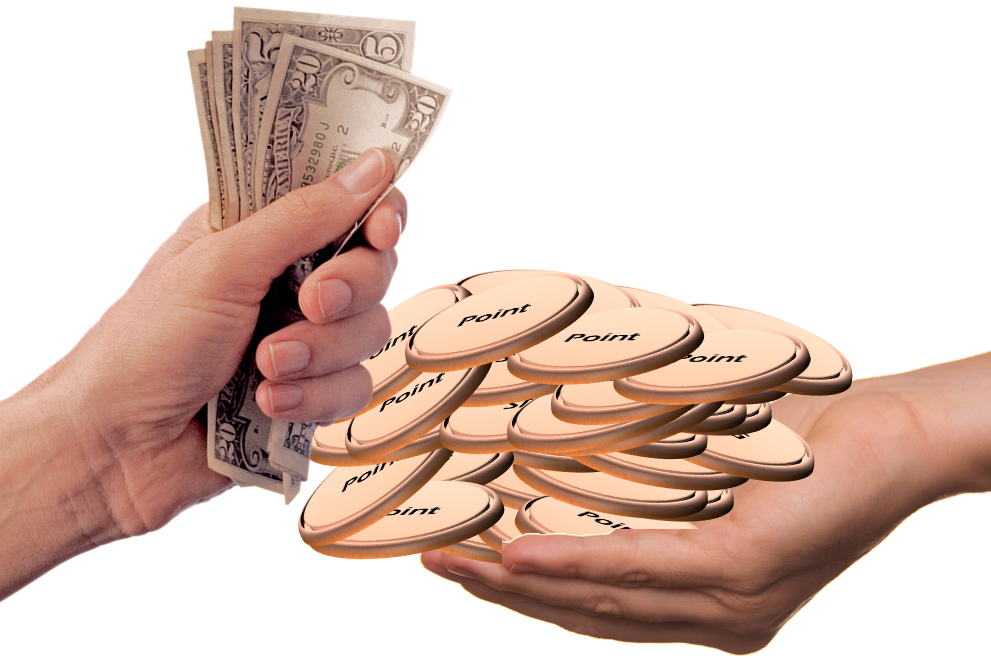Over the years, I have had a good deal of success with bank account bonuses. One of the reasons I love bank bonuses is because they provide the flexibility to buy points if and when I need them. The money earned from bank bonuses can really add up — one year my wife and I earned earned $4,680 from bank and brokerage bonuses and another we earned about $6,000. Extra cash on hand can be useful for many purposes, but it can perhaps be worthwhile to think of these bonuses in terms of the points you could buy with them — effectively turning that checking account bonus into a part of your miles and points accumulation strategy.

What’s new? We’ve updated this post with some more recent examples of bank bonuses and points sales. Chasing bank bonuses and converting that money into points during sales can be a great tool for your belt. Now is a great time to plot your strategy for the coming year.
Bank bonuses in brief
For the purposes of this post, I’m using the term “bank bonuses” to broadly refer to bonuses for opening and meeting requirements for checking, savings, and brokerage accounts. Financial institutions often offer bonuses for opening accounts and meeting minimum requirements.
Minimum requirements to earn a bank bonus may include things like maintaining a minimum balance, processing a minimum number of debit card transactions, or receiving some amount of direct deposit activity. While account terms typically stipulate that any direct deposit requirement must be met with funds from an employer, pension, social security, etc, the truth is that those requirements can often be met more easily than it seems. Doctor of Credit maintains a fantastic resource about what works for various banks.
It is not uncommon to see bonuses in the $100-$500 range for a new bank account. These can add up to a nice chunk of change for a couple playing in 2-player mode. Sometimes, a single bonus can be a significant chunk of change. We saw a deal from HSBC a few years ago that provided $1300 for a 2-player household and earlier this fall Tim wrote about a $900 business checking bonus. Other accounts have quite simple requirements (I’ve opened a few with $500 direct deposit requirements that paid out $200 or more as a bonus). Doctor of Credit maintains an incredibly comprehensive resource list of current bank bonuses and requirements here.
Why bother with bank bonuses?

On the surface, the answer to this question is money. Bank bonuses represent the possibility of easy money that requires low effort. Whereas a cash back credit card offering a $500 bonus likely requires $3,000-$5,000 in spending, bank bonuses only typically require cash inflow.
However, bank bonuses do require some amount of time and organization. Juggling multiple bonuses at once might require shuffling money around several times a month. If you don’t time transfers properly, your money can be tied up when you need it. And at tax time, bank bonus chasing can lead to a lot of forms. Still, I find bank bonuses to be well worth the time and effort.
Thanks to bank bonuses, I’ve been able to invest more in my future since a number of the bonuses I’ve earned have ultimately made their way into investment accounts. Furthermore, picking up bank bonuses has meant that I am well-positioned to take advantage of points sales if and when I need points for future travels.
Thinking of bank bonuses in terms of points

A couple of years ago, a reader in our Frequent Miler Insiders Facebook group asked the following question:
Other than applying for more cards, is anyone aware of any promotions offering miles or gift cards for making large deposits at brokerages or banks? There used to be a lot of them in the past, but haven’t seen any for a long time. Thanks.
As Mike implies, we have seen times in the past where you could earn miles for opening bank or brokerage accounts. Years ago, we used to see offers for American Airlines miles with a new Fidelity brokerage account or a Citi checking account. Bask Bank offers an account that pays out American Airlines miles monthly instead of interest (we wrote about that account when it debuted, but the current intro offer is relatively low and the opportunity cost given current interest rates might be too high for some). Amex has offered a bonus as high as 50,000 Membership Rewards points for opening a business checking account (that offer has since expired, but we’ve continued to see other offers).
However, in response to Mike’s question, I reiterated a point I’ve made before: don’t sleep on the bank bonuses. Major airline programs often put miles on sale for around 2 cents per mile or less. Some airlines put them on sale even more cheaply (we often see Avianca LifeMiles sell miles for around 1.3c each and have occasionally seen Air Canada Aeroplan offer miles around the same price). A $500 checking account bonus could buy:
- 25,000 airline miles at 2c per mile
- 38,000 airline miles when on sale for 1.3c per mile
- 62,500 Marriott or Choice Privileges points at 0.8c per point (only available on sale sometimes)
- 100,000 Hilton Honors points at 0.5c per point (frequent sale price)
- 100,000 IHG Rewards points at 0.5c per point (sale price a few times a year)
- 70,000 Wyndham Rewards points with its current sale if you’re targeted for the highest rate (actually 69,930 points — you’ll need to kick in another couple of dollars to buy 70K).
Note that we sometimes see miles on sale even more cheaply than shown above; American and Alaska periodically put miles on sale for just under 2c per mile and we’ve seen Air Canada Aeroplan and Avianca LifeMiles offer miles as low as ~1.2c per mile (or even a bit less in Avianca’s case). Hotel points can often be purchased for less than a cent and may get even cheaper at times. It is possible to get credit-card-sized welcome bonuses from checking accounts in some cases.
However, note that my numbers above do not take into account the fact that a bank bonus is taxable and therefore a single $500 bonus does not actually net $500 after tax. I picked that number as a round number that could pretty easily be achieved with just one or two decent bank bonuses, but you can adjust up or down depending on how many bonuses you may chase. The point is that bank bonuses can yield points — and rather than being stuck with points in one specific program, you can have the freedom to pick the program and price point that makes sense for you.
That flexibility is huge. If a bank offered a bonus of 100,000 Hilton points or 70,000 Wyndham points or even ~40,000 airline miles, I bet it would be wildly popular. In reality, cash could become any of the above.
Is it worth the trouble?
Readers new to bank bonuses often wonder whether they are worth the trouble. Whether primarily concerned about the additional 1099 forms and taxes or risks of shut down or the hassle and time cost of making sure to meet requirements, readers often wonder whether they should bother.
For example, in my case, I have sometimes juggled four or five banks at one time that each require monthly direct deposits, sometimes moving the same pot of money in a loop to meet direct deposit requirements in multiple places at once. It can be a pain to stay on top of the need to move money from one bank to the next. It’s possible that some banks could find the frequent movement of money in and out to be suspicious, although I’ve not had notable trouble there.
It’s worth noting that most bank account and brokerage bonuses do not require a long-term commitment, but some do. Some banks only require money be deposited and held at the bank for as few as 30 days (such as these bonuses, which would only require keeping money on deposit for as few as 30 days if you timed your initial deposit right). At the other end of the spectrum, we’ve seen Robinhood and Webull offer bonuses on moving retirement accounts with the stipulation that you not move those investments back out for five years or else forfeit some of the bonus.
Still, I think that the biggest obstacle for most people is that chasing bank bonuses adds complication. When such bonuses have come up in discussion on Frequent Miler on the Air, Greg has noted that he is interested in simplifying his finances rather than complicating them. Bank bonuses do not help simplify things. While I find bank bonuses to be low effort overall, juggling multiple at the same time has sometimes required more time and effort than I’d like. Still, with the ability to automate transfers in some cases, it doesn’t have to be terribly painful. To each his own in terms of pain tolerance.
Bottom line
Bank bonuses can be a source of points and miles if you’re able to squirrel away the points with an eye toward future travels. It wouldn’t be difficult to leverage a single bank bonus into enough miles for a flight or two or maybe even a couple of nights in a hotel or vacation rental. Having the extra cash on hand and perhaps even earmarked specifically for points sales can help you get outsized value from bank account bonuses. But an even stronger point in favor of earning bank bonuses is the flexibility. Rather than being stuck with a single made-up pseudo-currency, you have the power to only buy points if and when you want/need them or the ability to instead invest that cash for greater future returns. In just a two-year span in 2020 and 2021, my wife and I chased down more than $10,000 in bank bonuses. We’ve slowed a bit over the past couple of years, but we intend to get back into the swing of bank bonuses in the new year. If and when we need points, we can easily buy them with cash earned from bank bonuses. And if we don’t need to buy points in the near-term after earning a bank bonus, we’ll let that money grow in investments waiting to cherry-pick the right opportunity down the road.





I strive to earn enough money through bank account bonuses to offset the annual fee from the credit cards I’m holding in a given year. That allows me to think of the points and perks earned from the CCs as truly “free” (offset by the $$$ earned through bank bonuses).
DITTO
Worth mentioning also the various bank bonuses (One Cash, Alliant, SoFi, etc) through Rakuten that are redeemable as Amex MR points. Recent promotions have allowed a cumulative bonus as high as 62,500 points for relatively simple direct deposits.
We travel as a family and do not enjoy staying in hotel rooms. I earn the bank bonuses specifically to pay for larger Airbnbs which makes our vacations a lot more comfortable. I now splurge quite a bit on a fancy villa or apartment and it’s really fun. Staying at an Airbnb also feels more connected to the country you are in compared to staying at a resort.
The parts about this that scare me are how long to leave the money in the new account before closing it – I’ve had bloggers who churn accounts say to close after a year, which seems a long time to make this worthwhile. the other thing is poisoning the well: if I piss off Chase to get $900 and they close me down on all my cards because of some real or perceived abuse then I’ve just shot myself in the foot big time.
Seems our friends at Chex Systems are slowly choking moderate to agressive churning of bank bonuses now too. Why can’t we have nice things?
This reads like an April Fools post. You’re trying to convince people that cash is actually a useful currency, and that even if one can’t think of anything to do with money, it could still be converted into much harder to use, less flexible, but somehow infinitely shinier, airline and hotel points.
I value points higher than their cost to earn. If I can earn points under $.02 per, and redeem for $.05-.10 for luxury travel, that’s a pretty worthwhile profit.
What can be used for direct deposits? One tends to think of paycheck or retirement pension but that is just 1x a month. Is there a way to ‘create’ direct deposits that aren’t ACH transfers?
Nick how do you – moving the same pot of money in a loop to meet direct deposit requirements in multiple places at once.
Doctor of Credit has a great intro to bank bonuses article that answers these questions.
As a first timer, I would try 1 bonus at a time, so you don’t get overwhelmed.
I also like that these bank account bonuses can be repeated every 1-2 years, based on the terms.
Usually the best bonuses come from the biggest banks. I’m working on Chase, US Bank, and Capital One bonuses right now.
Happy holidays Nick and the rest of the Frequent Miler team!
Plus it’s only scalable to a certain tipping point. But to your point, if you’re churning cards & bank accounts, it can be a lot to track, especially in multiplayer mode.
Some bonuses require you to keep the account open for a certain period of time or else there is an early termination fee. How do they enforce that fee if you withdraw all the money first and then close the account. Do they send you a bill for the fee?
They could apply the ETF before the account is closed and the account will close with a negative balance. That could affect your ability to open accounts in the future. Better to follow the T&C. Good luck !
Do you keep all of those bank accounts open? Close after one year? It must be a bit of a hassle to have 15-20 accounts open
I try to close mine ASAP while avoiding early termination fees.
Many offers say something like, “must not have held an account with us for 180 days,” so resetting the clock lets you churn the bonus.
This is arbitrary mind accounting. The decision to buy miles is completely independent from the decision to go for bank bonuses. A dollar is a dollar whether earned from a bank bonus or a paycheck. Tricking yourself into thinking this money is somehow free or found money that can be spent more frivalously than other money is simply fallacious. If you wouldn’t buy something with paycheck money then you shouldn’t buy it with bank bonus money.
Besidess, cash is the more universal means of assessing value, not miles, so it makes more sense to think of your miles earning in terms of cash (through CPP and such) than the inverse.
I understand your point but disagree with your rationale. If your salary suddenly doubled, are there things that you would buy with some of your newfound wealth that you wouldn’t buy today? I put it that way to disagree with your premise that “if you wouldn’t buy something with paycheck money then you shouldn’t buy it with bank bonus money”. Picking up extra unexpected income is exactly the time when I am most likely to consider a frivolous purchase.
You are obviously right that money is money, but my point here was mostly to say that bank bonus money can be a good way to free up the extra funds for a frivolous purchase like buying miles.
For me the bank bonus thing is fun. And lucrative. My bank and brokerage bonuses last six months add up to $4600. That’s real money. Thanks FM and DoC!
Can you share what the bonuses came feom?.
Thanks
go to doctor of credit. Search bank bonuses. He’s the man for this thing
Is 2¢ per mile for AAdvantage Miles only a good deal if you have a specific use in mind? The current promo is 2.1¢ per mile if you but 150,000 miles. Obviously, it would need to be an international biz class ticket since coach fares are so cheap all over the place right now, and even biz class tickets are almost cheaper than buying miles depending on the itinerary.
You could also use 500 dollars to purchase gift cards from Simon Mall if you have liquidation options and you would earn over 100k transferrable points if you have a card like the Citi Double Cash. The cost would be even less if you are able to take advantage of their sales from 30 to 50% off. More work + more risk = more rewards.